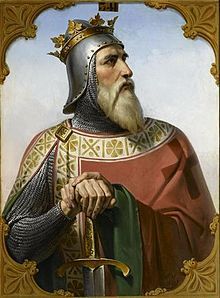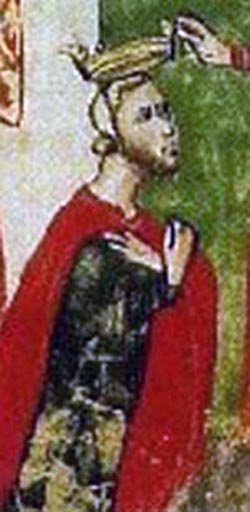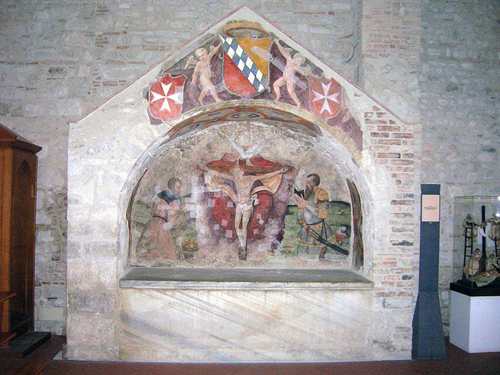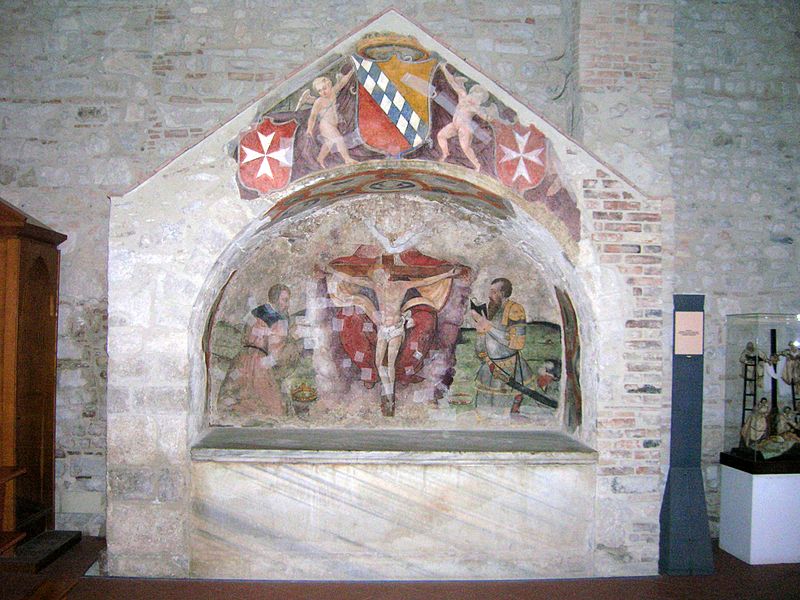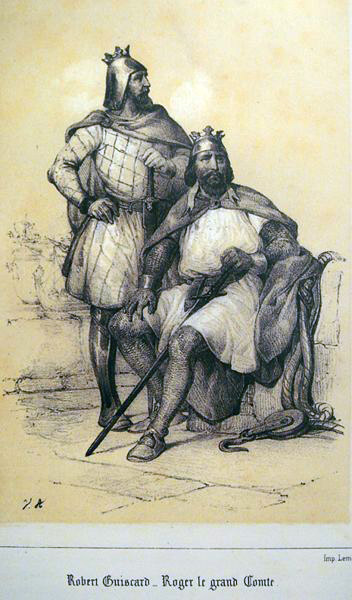Robert Guiscard was of Norman descent, the sixth son of Tancred of Hauteville and eldest by his second wife Fressenda of Normandy. Grandson of Richard I, the 3rd Duke of Burgundy.
Husband of Albereda of Buonalbergo, the daughter of Reginald I, Count of Burgundy and Adelais of Nornmandy, and granddaughter of Othon Guillaume de Bourgogne and Ermetrude de Roucy, Richard II the 4th Duke of Normandy and Judith de Bretagne. They were married about 1051 and had two children:
Emma, mother of Tancred Prince of Galilee
Prince Bohemond I of Antioch
Robert divorced Albereda about 1058 and married Sikelgaita, the daughter of Guaimar IV, Prince of Salerno. They had eight children:
* Mafalda, wife of Ramon Berenguer II, Count of Barcelona
* Roger Borsa
* Mabile, wife of William de Grantmesnil
* Gersent, wife of Hugh of Maine
* Robert Scalio
* Guy, Duke of Amalfi d 1107
* Sibylla, wife of Ebles de Ramerupt, Count of Roucy
* Olympias, betrothed to Constantine Doukas
According to legend in 1047 he left Normandy with five mounted riders and foot soldiers for Langobardia where he became the chief of a roving robber band. Anna Comnena gave a physical description of Guiscard that included a tyrannical temperament, a cunning mind, brave in action, clever in attack, most obstinate in achievement and he did not allow any obstacle to prevent his executing his desire. The tallest of his peers, ruddy complexion, flaxen hair and broad shoulders with eyes that "all but emitted sparks of fire." His cry, "Is said to have put thousands to flight." Then, "equipped by fortune, physique and character, he was naturally indomitable, and subordinate to no one in the world."
Robert would be involved in local feuding before being granted the command of the fortress at Scribula from his brother, Drogo. Robert settled at the castle at San Marco Argentano instead.
While in Calabria and still a robber baron, Robert married Albereda of Buonalbergo. Albereda's dowry consisted of two hundred knights arranged by her uncle Lord Girard of Buonalbergo, looking for Robert's support.
Robert distinguished himself at the Battle of Civitate in 1053 fighting with his brother Humphrey and his father-in-law against Pope Leo's forces who wanted Normans removed from Italy. Robert was unseated and remounted thrice, then honored for his actions by succeeding Humphrey as Count of Apulia in 1057.
Meanwhile, Pope Nicholas had strengthened law prohibiting consanguinity, which gave Robert the ability to easily repudiate Albereda about 1058. Evidently the 'divorce' was amicable. Soon after, Robert would marry Sichelgaita, the sister of a previous adversary's successor, Gisulf II of Salerno. In return for her hand in marriage, Robert agreed to destroy his brother, William's castle on Guisulf's territory.
The Papacy reversed their policy and made the Normans their allies, investing Robert as Duke of Apulia, Calabria and Sicily.
Robert and his brother Roger captured Messina in 1061 and Palermo in 1072. A campaign in 1064 failed as his campsite became infested with tarantulas to where it had to be abandoned. During this time he became known as "Black Shirt Robert" as his elegant clothing with imported dyes ran together to make black. In 1076 he took Salerno, expelling his wife's brother, Gisulf.
His campaign against the Byzantine empire included an infamous sword fight where Robert faced his most worthy adversary and nemesis, Emperor Alexius, at the Battle of Dyrrhachium, in October of 1081. His wife, Sikelgaita fought along side him in full armour.
Robert died of a fever along with 500 of his Norman knights at Corfu on the 17th of July, 1085. He was seventy years old.
The town of Fiscardo on Kefalonia is named after him, he was succeeded by his sons Roger Borsa. Robert is credited with bringing Latin Christianity to the Byzantine territory.
.
Robert Guiscard was of Norman descent, the sixth son of Tancred of Hauteville and eldest by his second wife Fressenda of Normandy. Grandson of Richard I, the 3rd Duke of Burgundy.
Husband of Albereda of Buonalbergo, the daughter of Reginald I, Count of Burgundy and Adelais of Nornmandy, and granddaughter of Othon Guillaume de Bourgogne and Ermetrude de Roucy, Richard II the 4th Duke of Normandy and Judith de Bretagne. They were married about 1051 and had two children:
Emma, mother of Tancred Prince of Galilee
Prince Bohemond I of Antioch
Robert divorced Albereda about 1058 and married Sikelgaita, the daughter of Guaimar IV, Prince of Salerno. They had eight children:
* Mafalda, wife of Ramon Berenguer II, Count of Barcelona
* Roger Borsa
* Mabile, wife of William de Grantmesnil
* Gersent, wife of Hugh of Maine
* Robert Scalio
* Guy, Duke of Amalfi d 1107
* Sibylla, wife of Ebles de Ramerupt, Count of Roucy
* Olympias, betrothed to Constantine Doukas
According to legend in 1047 he left Normandy with five mounted riders and foot soldiers for Langobardia where he became the chief of a roving robber band. Anna Comnena gave a physical description of Guiscard that included a tyrannical temperament, a cunning mind, brave in action, clever in attack, most obstinate in achievement and he did not allow any obstacle to prevent his executing his desire. The tallest of his peers, ruddy complexion, flaxen hair and broad shoulders with eyes that "all but emitted sparks of fire." His cry, "Is said to have put thousands to flight." Then, "equipped by fortune, physique and character, he was naturally indomitable, and subordinate to no one in the world."
Robert would be involved in local feuding before being granted the command of the fortress at Scribula from his brother, Drogo. Robert settled at the castle at San Marco Argentano instead.
While in Calabria and still a robber baron, Robert married Albereda of Buonalbergo. Albereda's dowry consisted of two hundred knights arranged by her uncle Lord Girard of Buonalbergo, looking for Robert's support.
Robert distinguished himself at the Battle of Civitate in 1053 fighting with his brother Humphrey and his father-in-law against Pope Leo's forces who wanted Normans removed from Italy. Robert was unseated and remounted thrice, then honored for his actions by succeeding Humphrey as Count of Apulia in 1057.
Meanwhile, Pope Nicholas had strengthened law prohibiting consanguinity, which gave Robert the ability to easily repudiate Albereda about 1058. Evidently the 'divorce' was amicable. Soon after, Robert would marry Sichelgaita, the sister of a previous adversary's successor, Gisulf II of Salerno. In return for her hand in marriage, Robert agreed to destroy his brother, William's castle on Guisulf's territory.
The Papacy reversed their policy and made the Normans their allies, investing Robert as Duke of Apulia, Calabria and Sicily.
Robert and his brother Roger captured Messina in 1061 and Palermo in 1072. A campaign in 1064 failed as his campsite became infested with tarantulas to where it had to be abandoned. During this time he became known as "Black Shirt Robert" as his elegant clothing with imported dyes ran together to make black. In 1076 he took Salerno, expelling his wife's brother, Gisulf.
His campaign against the Byzantine empire included an infamous sword fight where Robert faced his most worthy adversary and nemesis, Emperor Alexius, at the Battle of Dyrrhachium, in October of 1081. His wife, Sikelgaita fought along side him in full armour.
Robert died of a fever along with 500 of his Norman knights at Corfu on the 17th of July, 1085. He was seventy years old.
The town of Fiscardo on Kefalonia is named after him, he was succeeded by his sons Roger Borsa. Robert is credited with bringing Latin Christianity to the Byzantine territory.
.
Family Members
Advertisement
Explore more
Sponsored by Ancestry
Advertisement
